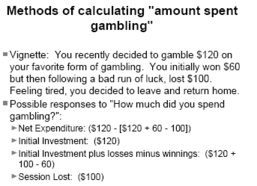One basic standard of sound survey research methodology is to ask each survey question in a way that minimizes the ways the question can be interpreted. Gambling researchers have been interested in the question of amount individuals spend on gambling, with a typical hypothesis being that pathological gamblers spend larger amounts of their available money on gambling than non-pathological gamblers. However, one individual may consider their gambling expenditure as the total amount spent in the gambling episode, while another individual may consider their gambling expenditure as the net loss after subtracting the gains. Blaszczynski & colleagues examined the range of interpretations that typical survey respondents have to the question “how much do you spend gambling?” [1] A sample of 181 medical students were asked how much was spent in five vignettes of various gambling scenarios presented to them. For each vignette, respondents were asked “how much was won”, “how much was lost”, and “how much was spent gambling”. In one of the vignettes (shown below), respondents calculated the response to “how much was spent gambling” in a variety of ways: 63.9% calculated net expenditure, 16.7% calculated the initial investment, 5.6% calculated initial investment plus losses minus winnings, 3.9% calculated sesion loss, and 10.1% used another strategy. Overestimates of gambling expenditure are related to reporting turnover (total amount gambled inclusive of wins which are re-invested) and/or incidental costs (e.g., travel, food) in their calculation of amount spent gambling. As self-reported gambling expenditures are often used to estimate community or sub-population expenditures for public health or policy-making purposes and to provide a clinical marker for risky gambling behavior, it is important to assure consistency in the interpretation of this question. Blaszczynski & colleagues recommend that clear instructions on how to calculate expenditure be included in surveys asking respondents to estimate how much they spend gambling. Their recommendation for the most relevant estimate of gambling expenditure is net expenditure (the amount gambled less winnings, or gross profit).
Sources:
- Shaffer, H.J., Hall, M.N., & Vander Bilt, J. (1997). Estimating the prevalence of disordered gambling behavior in the United States and Canada: A meta-analysis. Boston: President and Fellows of Harvard College.
- Federman, E.J., Krebs, C., Drebing, C.E., Colburn, N., Beaman, A., Marshall, J. & Penk, W. (1998, April). Gambling: An under-diagnosed and costly disorder. Poster session presented at the NIDA Town Meeting, Boston, MA .
This public education project is funded, in part, by The Andrews Foundation.
This fax may be copied without permission. Please cite The WAGER as the source.
For more information contact the Massachusetts Council on Compulsive Gambling,
190 High Street, Suite 6, Boston, MA 02110, U.S.





